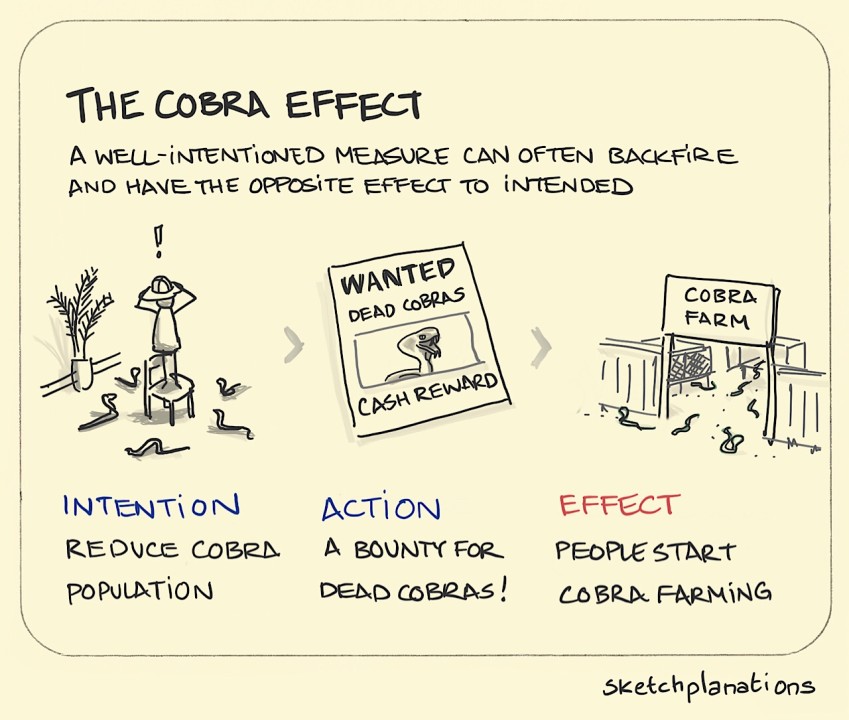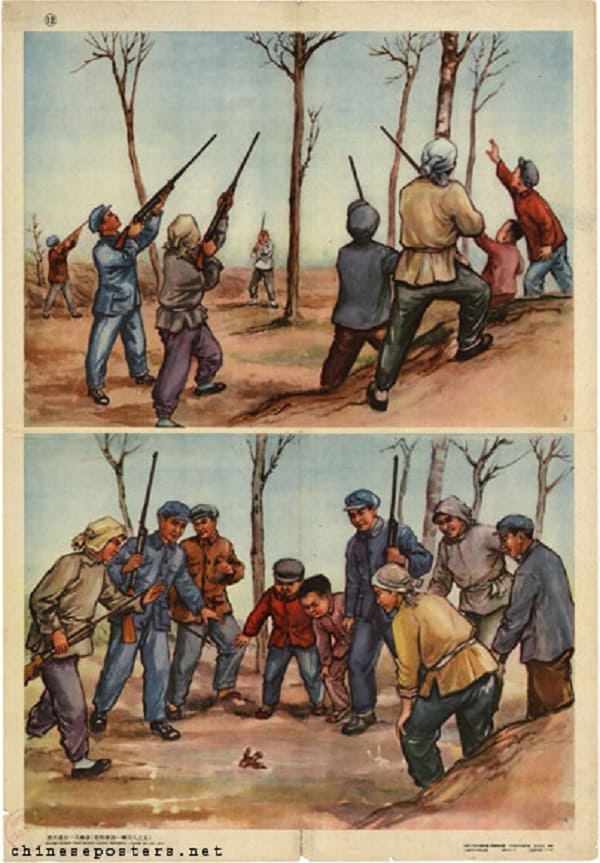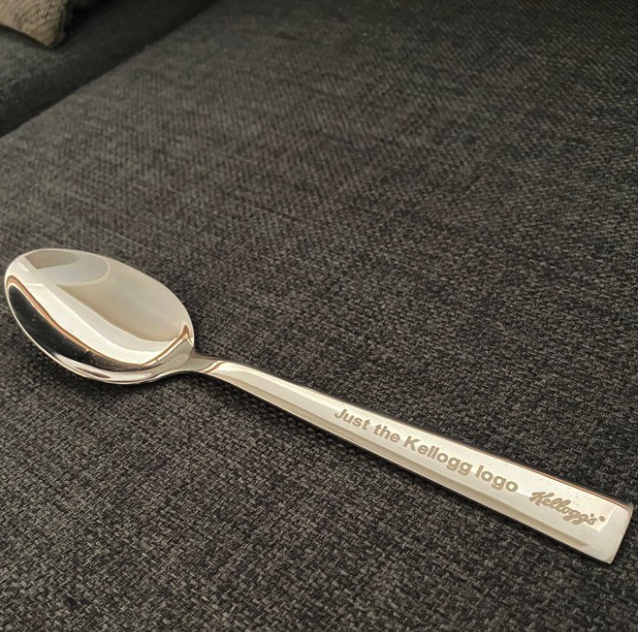California has a new security deposit law. Up until now, a landlord in California could charge a security deposit equal to 2 month’s rent if an apartment was unfurnished or 3 month’s rent if an apartment was furnished. Under the new law, the maximum deposit is 1 month’s rent, whether the apartment is furnished or unfurnished. The purpose of this law is to make it easier for people with limited financial resources to rent an apartment by reducing the amount of money required to get a lease, but this law may well do just the opposite. This may turn out to be an example of the Cobra Effect. I had a professor in college who talked a lot about that subject a lot.The Cobra Effect refers to a law or government policy that makes a problem worse that it was intended to solve. It is very common.
The Cobra Effect. In the 19th Century, when India was under British rule, the government became concerned about the high number of cobras in the Delhi metropolitan area. In an effort to reduce the cobra population, the British government offered a bounty for dead cobras. Anyone turning in a dead cobra received a cash reward. Initially, the program appeared to be a success. Large numbers of dead cobras were turned in. That should have reduced the cobra population, but the number of reported deaths from cobra bites wasn’t going down. It was rising. That puzzled the British authorities. They finally figured out that enterprising people were breeding cobras in captivity in order to get the reward. When the British government became aware of the fact that they were being hoodwinked, they scrapped the program. That made the snakes being bred for sale to the British worthless, so the cobra breeders turned their snakes loose in the wild. In the end, there were a lot more cobras in the area than before the government tried to eradicate them. That’s called the Cobra Effect. A lot of economists have written about this.

The Great Chinese Famine. One of the most devastating examples of the Cobra Effect was the Great Chinese Famine of the early 1960s. That happened when a program designed to increase food production resulted in 30 to 50 million people dying of starvation. In 1957, Mao Tse Tung claimed that rice and wheat yields were low because sparrows were eating too much grain. Sparrows were declared “animals of Capitalism”, and the government began a nationwide ‘Smash Sparrows’ campaign. People were required to kill sparrows and were assigned quotas of how many dead sparrows they had to turn in at government offices every week. If people exceeded their quotas, they received rewards. If they failed to meet their quotas, they were punished. Tens of millions of sparrows were killed, and by 1960, sparrows had become virtually extinct in China. However, the disappearance of sparrows meant that locusts were able to breed unchecked because their principal predators, the sparrows, were gone. Billions of locusts descended on China and devastated the country. Incredibly, a locust can eat its own body weight in food every day. Grain production plummeted. Once the government realized its mistake, they imported 250,000 sparrows from the Soviet Union to restore the natural balance. Eventually that ended the famine. Below is a picture of a Chinese school poster from 1959 showing a boy with a slingshot killing a sparrow. The girl is holding a string of dead sparrows. The slogan at the bottom of the poster says: “Everybody Comes to Beat the Sparrows.” After 1962, bedbugs replaced sparrows on school posters in China as an ‘animal of Capitalism.’ Here is one of the many videos on YouTube about Mao’s war on sparrows: The War on Sparrows.



SECURITY DEPOSITS.
But – what does all this talk about cobras and sparrows have to do with security deposits? California’s new security deposit law is intended to make it easier for people with limited financial resources to rent an apartment; however, this law creates a financial incentive for landlords to do just the opposite.
Under the old law, an applicant for an apartment in California might have to come up with 3 month’s rent in order to get an apartment, the first month’s rent plus 2 month’s security deposit. So, if an apartment is $3,000 a month (which is what a 1-bedroom apartment typically rents for in one of the new apartment houses in Berkeley), an applicant might need to give the building manager $9,000 to get a lease. What percentage of people in our society have $9,000? 50% of all Americans have less than $1,000 in savings. 33% have no savings at all. So, what’s the problem with lowering security deposits from 2 month’s rent to 1 month’s rent?
First, you need to answer the question: “Why do landlords want security deposits?” The reason that landlords want security deposits is so that they won’t lose money if a tenant moves out with unpaid rent or with expensive damages to the apartment. The less money that a landlord is holding in the security deposit, the more risk the landlord is taking by renting an apartment to someone who is living from paycheck to paycheck and has little or no savings. This new law creates a strong incentive for landlords to only rent apartments to people with high credit scores and serious money in the bank. That is the opposite of this law’s intention. The mentality behind this law is that if something is bad for landlords, it is good for tenants. I have never been able to convince people who think that way that they are wrong, and that the world doesn’t work that way.
OAKLAND’S GUN BUYBACK PROGRAM. Here’s another example of the Cobra Effect, one closer to home. In 2008, the Oakland police department ran a gun buyback program called ‘One Less Gun’. The purpose was to reduce the number of guns in Oakland, but the result was the opposite. Under the ‘One Less Gun’ program, anyone could turn in a gun and walk away with $250 cash with no questions asked and no I.D. required. On the opening day of the program, the first people in line were gun dealers. Some came with 50 guns in the trunks of their cars. Most of these guns were in poor condition, and many were inoperable. The gun dealers used the money they got from the police to buy more and better guns. Some nursing home operators also turned in large numbers of guns, guns taken from their residents. That also cost the Oakland police department a lot of money, even though elderly residents in nursing homes aren’t the kind of people who are likely to use guns to commit crimes. Many sketchy characters turned in defective guns and got money from the police which they used to buy new guns. So many guns were turned in that the police department quickly ran out of money and had to issue I.O.U.s., leaving the police department with a debt of $170,000. Oakland never ran a gun buyback program again. Several other big cities have run gun buyback programs with similar results.
BLOWING UP A DEAD WHALE. Perhaps the funniest example of the Cobra Effect was the attempted disposal of a dead whale by the Oregon Highway Department by blowing it up. (It was funny, but not if you were there.) This was a big news story when it happened. In November 1970, a dead 40-foot whale washed up on a beach in Oregon. It had been so long since a dead whale had washed up on a beach in northern Oregon that nobody could remember how to get rid of one. The Highway Department decided the best way to dispose of the whale was to blow it up. They planted 20 cases of dynamite under the whale. They figured that would blow the whale into small particles which scavengers would dispose of. A biologist told the highway officials that the normal way of disposing of a dead whale was to have a tugboat drag it out to sea at high tide, where sharks and other large predators dispose of dead whales all the time, but her advice was ignored. Large numbers of people from the area came to see the explosion. When the explosion went off, the spectators cheered for a few seconds, but they then ran in panic when large chunks of rotting dead whale flesh rained down on them and their cars. The authorities had greatly underestimated the blast zone and what was a safe distance from it for the spectators. And, even after the explosion, the bulk of the dead whale was still intact and on the beach. Watch this video to see what happened: Blowing Up a Dead Whale. Like the other examples of the Cobra Effect above, blowing up the whale dramatically increased the cost of disposing of the whale.
KELLOGG’S SPOONS. When Kellogg ordered 30,000 promotional spoons, the manufacturer asked them what they wanted imprinted on the spoons. Kellogg replied: “Just the Kellogg logo.” The photo below shows what they got.

